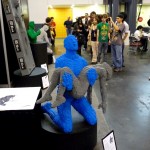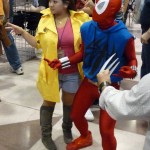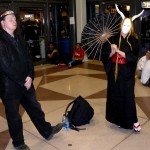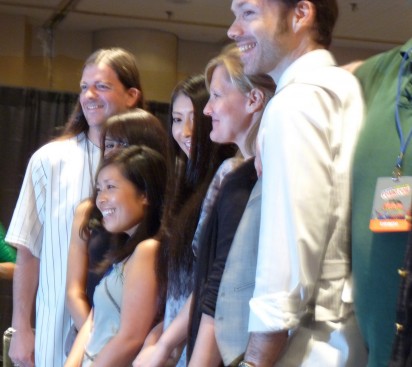The last time I went to the New York Anime Festival (NYAF) was two years ago and I had a great time. This year was a bit of a disappointment.
The main difference is that this time it was combined with the New York Comic Con (NYCC) and occupied almost all of the Javits Center (I think last time they only used half.) The combined show seemed to be about 80% American comics and 20% anime/manga. That’s not too surprising. It’s only natural that in America there is a lot more interest in American cartoons than in the Japanese equivalent.
But it felt like a letdown for me. Before people start flaming me, let me make it clear: there is nothing wrong with American comics. It’s just a matter of personal taste; I find the Japanese stuff a lot more fun.
Attendance was massive. The place was jam-packed, to the point where I started wondering what the fire code limits for the Javits Center might be.
As you may have noticed, I like to take pictures of cosplayers at these events. That didn’t work out too well. The ratio of cosplayers to mundanes was much lower than usual, and the crowding made it unusually difficult to get a shot. There were always people in the way, or I couldn’t get close enough, or far away enough. All I can say is “Thank God for digital photography!” I took about 50 shots and got maybe 6 that were usable. If I were still using film I would be rather upset.
The high point was a panel of voice actors featuring Minori Chihara, best know as the seiyuu for Yuki Nagato in Haruhi Suzumiya. What really struck me was how different Minori sounded from the American VAs, and not just because she was speaking Japanese with an interpreter. The Americans sounded like they were sitting around a table having a conversation. Minori used a stage voice and sounded like she was playing a character.
(She didn’t sound like Yuki. She sounded cute and energetic and maybe a bit giddy. Her Japanese was formal and polite.)
I think this is evidence of a cultural difference. I’m sure that both American voice actors and Japanese seiyuu think of public appearances as part of the job. And anyone who is appearing before a large crowd is going to be playing some sort of role. The difference, I think, is that Americans like to think of celebrities as their close personal friends, and want them to sound natural and unaffected, while the Japanese prefer to think of celebrities as larger-than-life fantasy figures. It’s also supposed to be a fundamental tenet of Japanese culture that you always present a public face that is totally upbeat and accommodating, and only reveal your true feelings to your immediate family and closest friends.
Photography was only permitted for a brief period at the end of the panel. Amid all the other jostling would-be photographers, I only managed to get one minimally acceptable shot.
She’s the one in the middle with the extra-long anime-style hair.








